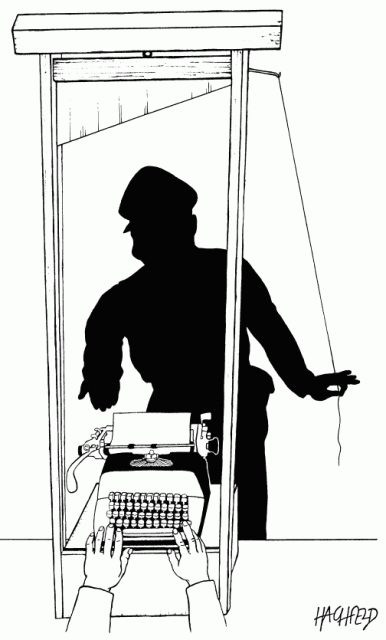Search
Democracy Links
Member's Off-site Blogs
freedom of the press .....

from Crikey .....
Media freedom hampered by media irresponsibility
An audit of the freedom of information available to the Australian media, released today, makes a powerful argument that free speech in Australia is being subtly whittled away.
The report (Report of the Independent Audit into the state of Free Speech in Australia) was commissioned by a media coalition, Australia’s Right to Know, and examined attempts by government to control media reporting, and legal constraints on publication.
The audit was led by Irene Moss, a former New South Wales ombudsman and commissioner of the Independent Commission Against Corruption. The factual basis for the proposition that the media’s freedom to obtain and published information is being whittled away is incontestable. The anti-terrorism laws alone are oppressive enough to justify this statement.
Then there is other evidence: Australia has slipped from 12th to 28th place on an international index of press freedom. There are 335 Acts of the Commonwealth Parliament with specific secrecy provisions to stop information on subjects ranging from gambling revenue to livestock disease. There are endless accounts of how the executive government perverts and frustrates the freedom of information laws in every jurisdiction.
The whistleblower protection laws are narrow, convoluted and inconsistent across Australia.
The courts are said to increasingly using suppression orders which prevent the media reporting the proceedings of the courts in certain circumstances.
This is all generally deplorable. In particular, the oppressiveness of the anti-terrorism laws, the failure of the laws of contempt to provide journalists with privilege to protect their sources of information, the abuse of the FOI laws and the widespread use of secrecy provisions in legislation are all ground for concern.
But this cannot be taken in isolation from the overall picture of media performance. So long as there is low public trust in the profession of journalism and in the media industry, there will be strong pushback against extending media freedom, no matter how damaging to the democracy limits on media freedom may be.
It is not just the responsibility of governments and the judiciary and parliament to make this flow of information work in the public interest. It is equally the responsibility of the profession of journalism and the industry of the media.
The slaggier ends of the profession and the industry behave in ways that positively invite tighter controls on information. It is a matter of profound frustration to the responsible ends of the profession and industry that this is so, but the remedy lies in their own hands, as much as in the hands of government, parliament and judiciary.
A book to be launched on Wednesday, Reputation Matters, by Peter Keel and Norman Lucas, partners at the law firm Clayton Utz, is just one example of the legitimate pushback on media licentiousness that exists.
The near-certainty that the High Court will pretty soon create a legal right to sue the media for breach of privacy is another example.
It is right for the media to fight for their corner, and it is a part of their responsibilities to argue forcefully for free speech and media freedom. The Moss Report is an excellent example of how to do this. It is a fine piece of work and deserves to be taken seriously.But efforts like this are undermined when the media do not shoulder their other responsibilities, particularly to be properly accountable for the use of their own powers and to put pressure on their more cowboyish elements to conform to minimal standards of ethical behaviour and truth-telling.
- By John Richardson at 6 Nov 2007 - 6:02am
- John Richardson's blog
- Login or register to post comments
Recent comments
18 hours 46 min ago
20 hours 49 min ago
21 hours 23 min ago
21 hours 48 min ago
22 hours 43 min ago
1 day 10 hours ago
1 day 17 hours ago
1 day 19 hours ago
1 day 20 hours ago
1 day 20 hours ago